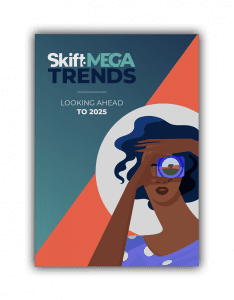Skift Take
By 2025, it turned out employees were happy to give up the office, but they wholeheartedly fought to keep some kind of physical interaction with coworkers.
In January 2021 we released our annual travel industry trends forecast, Skift Megatrends
. Because of the havoc that the pandemic triggered, we wrote Skift Travel Megatrends 2025 as a vision of how travel industry dynamics could play out five years from now. You can read about each of the trends on Skift, or download a copy here.
The abrupt digitalization of the workplace and office culture in 2020 led to a surprise boom in a somewhat new form of “corporate travel” in the following years. Remote employees around the world were increasingly required to attend in-person company-wide meetings for team-building and collaboration. This helped offset those billion dollar losses many feared would hit due to video conferencing.
Some of the early signals came from short-term rental providers, which saw their average length of stay driven upwards by on-the-move workers.
After the pandemic thrust workforces to stay at home, remote working took hold and employees didn’t just prove they were as efficient as before, they exceeded expectations. Productivity soared.
Some organizations nostalgically held on to their city headquarters, while others opted for impromptu satellite offices in other urban areas, centered around colleagues’ needs.
Work Trips Redefined
Remote working became big business. External meetings successfully moved online, boosted by advancements in virtual reality platforms. Then remote employees around the world were increasingly required to attend regular company-wide in-person meetings. In some countries it even became mandated by law in attempts to address employee morale, company cohesiveness, mental health concerns, and even physical wellbeing for a new generation that never knew what it was like to commute to an office everyday.
By 2025, the volume of these work trips by all employees — and not just the salespeople and executives — rivaled the record highs of 2019. All employees were now business travelers.
Hotels initially picked up a lot of the post-pandemic slack, diversifying into new brands to accommodate company-takeovers at their properties, and perfecting co-working spaces and subscription packages, competing against the likes of Citizen M and Mint House.
Airlines stepped up, too. A thriving charter market took hold, while international carriers launched subsidiaries to meet the requirements for discerning clients and higher standards.
In the old days of 2020, remote-working specialists like Ethos and Outsite operated on the fringes, and attracted digital nomads. Corporations would occasionally bring in these specialists for team-building getaways, or an annual get-together.
Not anymore. In 2025, a new breed of tour operator emerged, building exclusive retreats in remote destinations for organizations that would leverage them in the battle to land the best talent.
These offsite program perks became everything for a talent pool that now reached every corner of the planet.
Download Your Copy of Skift Travel Megatrends 2025
Skift Megatrends 2025 is made possible by our parters: Abu Dhabi Convention & Exhibition Bureau, Accor, and American Express.
Have a confidential tip for Skift? Get in touch
Tags: Skift Travel Megatrends 2025
Photo credit: Meetingsbooker.com launched a remote workspaces solution to facilitate the booking of local workspaces for teams working from home.

